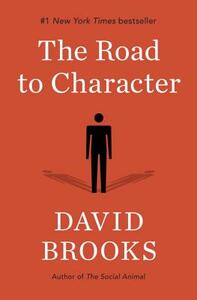Take a photo of a barcode or cover
This book was very well-written and researched. I enjoyed reading about all the different people Brooks referenced throughout history that I had never heard about. This book reminded me of the depth and skill that Malcolm Gladwell writes with. I also thought that Brooks’ conclusions and observations about modern society were very interesting.
I thought the premise was thoughtful and the suggested exercise at the end was useful, but I didn't find the illustrative biographies engaging.
The theme is similar to Postman's Building a Bridge to the 18th Century. Instead of confronting post-modernism, Brooks aims at morality of the self, finding that our culture has become too self-obsessed and uncritical of innate human desires. He lays a lot of blame for this excess on the meritocracy. He also acknowledges that the trends that started the self-worth campaigns were a response to repressive cultural norms, but believes that we have swung too far from the golden mean.
I found his ideas of how to struggle toward character useful, but I wouldn't recommend it unless you have an iron gut for biography. I couldn't find a way to engage the examples.
The theme is similar to Postman's Building a Bridge to the 18th Century. Instead of confronting post-modernism, Brooks aims at morality of the self, finding that our culture has become too self-obsessed and uncritical of innate human desires. He lays a lot of blame for this excess on the meritocracy. He also acknowledges that the trends that started the self-worth campaigns were a response to repressive cultural norms, but believes that we have swung too far from the golden mean.
I found his ideas of how to struggle toward character useful, but I wouldn't recommend it unless you have an iron gut for biography. I couldn't find a way to engage the examples.
This book provides short biographies of several people from history, focusing on the moral progression of their lives. The challenges and development of each person's character is described. It is expected that the stories of some of these people will resonate with the reader -- while other stories may not. The problem for me with these biographies was largely in the repeated focus on the spiritual perspective for most of these people and the repeated inclusion of "sin" as the moral obstacle (or set of obstacles) for each person to overcome. But, it was never quite clear to me what is meant by "sin". Is it sin against the person's self, or a god, or humanity, or culture? The repeated use of "sin" with no clear description of what is meant by it left me confused and so I didn't get much out of this book. The most meaningful chapter in the book was the last, where the book gives more salient descriptions of the characteristics and faults that many of us struggle with.
informative
reflective
slow-paced
It would not be accurate to say that I enjoyed reading this book. Reading it was challenging, and occasionally frustrating. I spent a lot of time wishing I could talk to the author - "What do you mean by that? Doesn't that contradict what you said earlier? Why did you choose this particular example? How on earth can you be so sure about that?" I ultimately decided that the time I spent questioning every part of this book was a positive thing, but it was a close call.
The general concept of this book is that in this age of self-esteem, people are putting too much stock in external achievements, and paying little to no attention to their internal moral development. Brooks was inspired to pursue this topic after listening to a radio broadcast from V-J Day, and observing how the radio personalities were all talking about humility, of all things, in the face of victory. When's the last time you heard someone talk about humility, except maybe in church? And even if you did hear about it in church, did you think about it at all Monday morning at work? Brooks argues that humility, along with a whole host of other virtues, are losing out to the "Big Me" ethos we're living in. He wants to write about how to get back to virtue, but he wisely acknowledges that he's in no position to tell other people how to live a virtuous life, so he's going to do this by sharing examples of virtuous lives.
The lives he chooses to showcase are varied in time and place. At first I was a little bummed because the first two men were military types (Eisenhower and General Marshall), and I was also frustrated because they were alternated with two women (Frances Perkins and Dorothy Day) who were far less famed for their accomplishments. (Of course, fame is not supposed to the be the point of leading a moral life, but still. Where were the badass lady generals?) Also, several of these people had super exemplary public moral lives but had terrible home lives. What's so great about that? It took me a while to get used to the idea that each chapter is written from the moral perspective of the person Brooks is profiling, so chapters often contradict each other. Brooks makes bold statements about ethics that he sometimes doesn't back up, but for the most part they are supported by the ethical views of the chapter's protagonist. The chapters get more varied after the first 4, and I started to buy the premise a little more. The persons Brooks profiles are not chosen for being perfect, but for having struggled to reach a moral life, and chronicling that struggle in a way that can be studied. In the end the book is more of an introduction to 9 (or more!) different moral systems than it is a road-map to character. (Brooks never promises a 7-step program to character, but somehow that's still what I wanted and didn't get.)
So if you read this book, don't expect it to change your life. For everything you read that feels true to your own sense of morality, you'll probably read 5 things that sound repulsive, or outdated, or impossible. But deciding for myself what was relevant and what was ridiculous became a worthwhile venture for me, and I left the book feeling that I had gained something, even if I wasn't sure exactly what.
The general concept of this book is that in this age of self-esteem, people are putting too much stock in external achievements, and paying little to no attention to their internal moral development. Brooks was inspired to pursue this topic after listening to a radio broadcast from V-J Day, and observing how the radio personalities were all talking about humility, of all things, in the face of victory. When's the last time you heard someone talk about humility, except maybe in church? And even if you did hear about it in church, did you think about it at all Monday morning at work? Brooks argues that humility, along with a whole host of other virtues, are losing out to the "Big Me" ethos we're living in. He wants to write about how to get back to virtue, but he wisely acknowledges that he's in no position to tell other people how to live a virtuous life, so he's going to do this by sharing examples of virtuous lives.
The lives he chooses to showcase are varied in time and place. At first I was a little bummed because the first two men were military types (Eisenhower and General Marshall), and I was also frustrated because they were alternated with two women (Frances Perkins and Dorothy Day) who were far less famed for their accomplishments. (Of course, fame is not supposed to the be the point of leading a moral life, but still. Where were the badass lady generals?) Also, several of these people had super exemplary public moral lives but had terrible home lives. What's so great about that? It took me a while to get used to the idea that each chapter is written from the moral perspective of the person Brooks is profiling, so chapters often contradict each other. Brooks makes bold statements about ethics that he sometimes doesn't back up, but for the most part they are supported by the ethical views of the chapter's protagonist. The chapters get more varied after the first 4, and I started to buy the premise a little more. The persons Brooks profiles are not chosen for being perfect, but for having struggled to reach a moral life, and chronicling that struggle in a way that can be studied. In the end the book is more of an introduction to 9 (or more!) different moral systems than it is a road-map to character. (Brooks never promises a 7-step program to character, but somehow that's still what I wanted and didn't get.)
So if you read this book, don't expect it to change your life. For everything you read that feels true to your own sense of morality, you'll probably read 5 things that sound repulsive, or outdated, or impossible. But deciding for myself what was relevant and what was ridiculous became a worthwhile venture for me, and I left the book feeling that I had gained something, even if I wasn't sure exactly what.
Ahh... how I hate writing scathing reviews of writers I love. And this one is all the more painful because this book ought to have been great, or at least good. It should have stood proudly in a long genre of principled books about the principle of virtues, a line that has grown thin in the 21st century and desperately in need of a fresh voice to reinvigorate the conversation. And by all accounts, one might have believed that David Brooks, with his astute eye toward history, his consequential views on human action and his prescient grounding in both the classics and Christian tradition ought to have been the one. But he wasn't.
The best and worst that I can say about the book is it is tragic to see someone who clearly cares so deeply about character write about it so poorly and incongruously. Even in the last chapter as Brooks attempts to frame the logic of his sprawling Reader's Digest of great biographies (which is what the rest of the book contains), his logic is ill-thought out, desperate for editing and absent any coherent line that could defensibly be called the Road to... Anything except confusion.
You read in the Acknowledgements that Brooks was attempting to write a different book and was steered in this deeper direction by his editor. She fed him new books to read, re-framed in arguments and essentially set up a completely different book than Mr. Brooks set out to write. What I believe happened in the process is she led Brooks to write a book he was incapable of writing. It is clearly the writing a man in process on a topic that has stirred him but not settled him. The waters on this sea are too unclear and therefore riddled with misdirection and misguidance. Perhaps if the book had been titled The Lost Maze of Character it wouldn't have so painfully over-promised and under-delivered. But who would want to buy a book titled that? Way to go publishers. A+.
The best and worst that I can say about the book is it is tragic to see someone who clearly cares so deeply about character write about it so poorly and incongruously. Even in the last chapter as Brooks attempts to frame the logic of his sprawling Reader's Digest of great biographies (which is what the rest of the book contains), his logic is ill-thought out, desperate for editing and absent any coherent line that could defensibly be called the Road to... Anything except confusion.
You read in the Acknowledgements that Brooks was attempting to write a different book and was steered in this deeper direction by his editor. She fed him new books to read, re-framed in arguments and essentially set up a completely different book than Mr. Brooks set out to write. What I believe happened in the process is she led Brooks to write a book he was incapable of writing. It is clearly the writing a man in process on a topic that has stirred him but not settled him. The waters on this sea are too unclear and therefore riddled with misdirection and misguidance. Perhaps if the book had been titled The Lost Maze of Character it wouldn't have so painfully over-promised and under-delivered. But who would want to buy a book titled that? Way to go publishers. A+.
emotional
hopeful
informative
fast-paced
Brooks' fresh treatment on a classic theme: that there's more to life than climbing the laddera and attaining worldly success. He does better than just wax poetic; The Road to Character is a set of concrete examples of people who lived out virtues like duty, dignity, service, sacrifice and self-mastery, in a time when those stood for something deeper than they do today.
At times I felt like a lesser person as the stories of others unfolded. That is not a bad thing, but a drive to see how others were enduring tough situations and made difficult decisions in how they would act or not was inspiring. Shows me I still have a lot of growth to keep working on and that, while humbling, is good to keep me trying to be the "best me".
My rating on the book is because it did not challenge me long enough with new, thought-provoking challenges to mull over. The message was well presented and I got it before halfway through the book.
It is really important to have books like this. Too many are about how to win, compete, all about you. This book did not avoid that, correctly so, but did focus on others. We do not focus on others enough these days other than how they get in our way or we are judging them. I need good examples of how others make their decisions to help us refine how we make ours. More options gives us the ability to make beetter choices.
My rating on the book is because it did not challenge me long enough with new, thought-provoking challenges to mull over. The message was well presented and I got it before halfway through the book.
It is really important to have books like this. Too many are about how to win, compete, all about you. This book did not avoid that, correctly so, but did focus on others. We do not focus on others enough these days other than how they get in our way or we are judging them. I need good examples of how others make their decisions to help us refine how we make ours. More options gives us the ability to make beetter choices.




